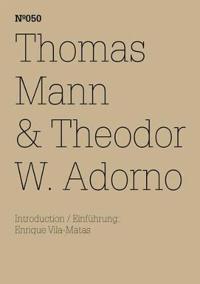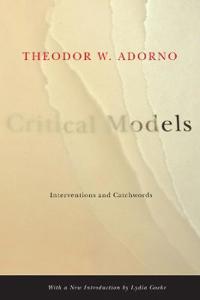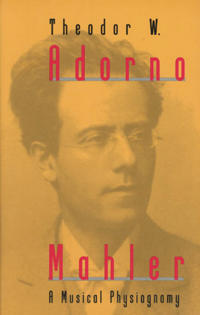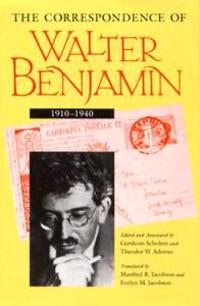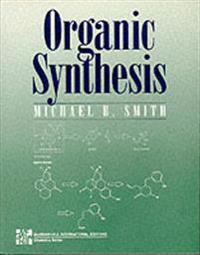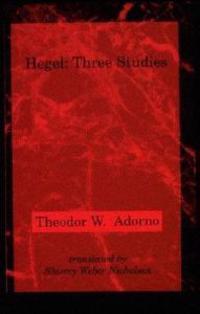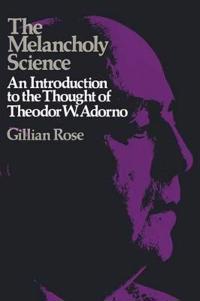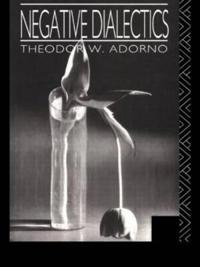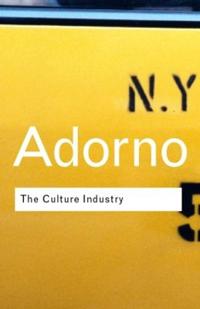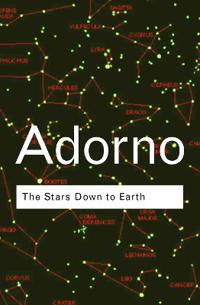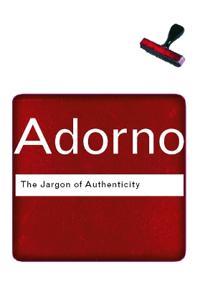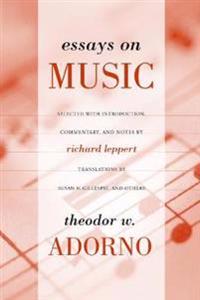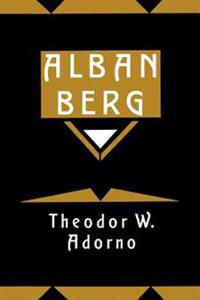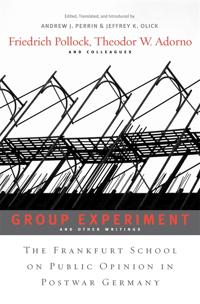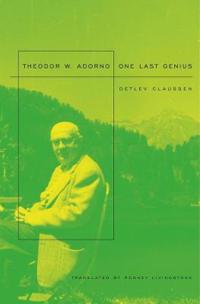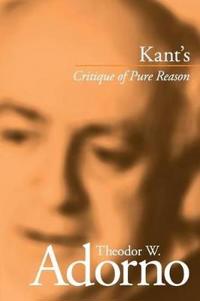Theodor W. Adorno: Negative Dialektik (Häftad)
avTheodor W. Adorno
ISBN: 9783050030463 - UTGIVEN: 200609In einem Brief nennt Adorno die "Negative Dialektik" kurz nach ihrem Erscheinen unter seinen Schriften "das philosophische Hauptwerk, wenn ich so sagen darf". Dieser herausgehobenen Bedeutung, die das Werk für Adorno hatte, entspricht nicht nur die lange Zeit, die er mit der Abfassung des Buchs b[...]
Thomas Mann & Theodor W. Adorno (Pocket)
avThomas Mann, Theodor W. Adorno, Enrique Vila-Matas
ISBN: 9783775728997 - UTGIVEN: 201204Critical Models (Pocket)
avTheodor W. Adorno, Henry W. Pickford, Theodor W. Adorno
ISBN: 9780231135054 - UTGIVEN: 2005-10Critical Models combines into a single volume two of Adorno's most important postwar works -- Interventions: Nine Critical Models (1963) and Catchwords: Critical Models II (1969). Written after his return to Germany in 1949, the articles, essays, and radio talks included in this volume speak to the [...]
Mahler (Pocket)
avTheodor W. Adorno, Edmund Jephcott, Theodor W. Adorno
ISBN: 9780226007694 - UTGIVEN: 199608Theodor W. Adorno's classic study of Gustav Mahler's music defies traditional thematic analysis, which, according to Adorno, "misses the music's substance in its preoccupation with procedure." He reaches beyond the boundaries of conventional analysis for an understanding of the music through the com[...]
The Correspondence of Walter Benjamin, 1910-1940 (Inbunden)
avWalter Benjamin, Gershom Scholem, Theodor W. Adorno
ISBN: 9780226042374 - UTGIVEN: 199406Called "the most important critic of his time" by Hannah Arendt, Walter Benjamin has also emerged as one of the most compelling thinkers of our time, his work assuming a crucial place in current debates over the interactions of art, culture, and meaning. A "natural and extraordinary talent for lette[...]
Notes to Literature: v. 1 (Övrig)
avTheodor W. Adorno
ISBN: 9780231063326 - UTGIVEN: 1991-06-17-- Susan Sontag
Notes To Literature (Pocket)
avTheodor W. Adorno
ISBN: 9780231069137 - UTGIVEN: 1994-03-10Available in English for the first time, this is a collection of essays by social philosopher and critic, T.W. Adorno, on such writers as Mann, Bloch, Holderlin, Kare Kraust, Sigfried Kracauer, Goethe, Benjamin and Stefan George. It includes Adorno's reflections on a variety of literary subjects.[...]
Things Beyond Resemblance: Collected Essays on Theodor W. Adorno (Övrig)
avRobert Hullot-Kentor
ISBN: 9780231136587 - UTGIVEN: 2006-08-11Theodor W. Adorno was a major twentieth-century philosopher and social critic whose writings on oppositional culture in art, music, and literature increasingly stand at the center of contemporary intellectual debate. In this excellent collection, Robert Hullot-Kentor, widely regarded as the most dis[...]
Things Beyond Resemblance: Collected Essays on Theodor W. Adorno (Övrig)
avRobert Hullot-Kentor
ISBN: 9780231136594 - UTGIVEN: 2008-03-12Theodor W. Adorno was a major twentieth-century philosopher and social critic whose writings on oppositional culture in art, music, and literature increasingly stand at the center of contemporary intellectual debate. In this excellent collection, Robert Hullot-Kentor, widely regarded as the most dis[...]
Prisms (Häftad)
avTheodor W. Adorno
ISBN: 9780262510257 - UTGIVEN: 198301The eminent critic and scholar analyzes a wide range of topics, including Aldous Huxley's Brave New World, jazz, the music of Bach, and museums[...]
Hegel (Häftad)
avTheodor W. Adorno
ISBN: 9780262510806 - UTGIVEN: 199411This short masterwork in twentieth-century philosophy provides both a major reinterpretation of Hegel and insight into the evolution of Adorno's critical theory. The first study focuses on the relationship of reason, the individual, and society in Hegel, defending him against the criticism that he w[...]
The Melancholy Science: An Introduction to the Thought of Theodor W. Adorno (häftad)
ISBN: 9780333232149 - UTGIVEN: 1978-12"The Melancholy Science" is Gillian Rose s investigation into TheodorAdorno s work and legacy. Rose uncovers the unity discernableamong the many fragments of Adorno s oeuvre, and argues that hisinfluence has been to turn Marxism into a search for style.
The attempts of Adorno, Lukacs and Benjami[...]Negative Dialectics (Pocket)
avTheodor W. Adorno
ISBN: 9780415052214 - UTGIVEN: 1990-04This is the first British paperback edition of this modern classic written by one of the towering intellectual of the twentieth century. Theodor Adorno (1903-69) was a leading member of the Frankfurt School. His books include The Jargon of Authenticity, Dialectic of Enlightenment (with Max Horkheime[...]
The Culture Industry (Häftad)
avTheodor W. Adorno
ISBN: 9780415253802 - UTGIVEN: 200105The creation of the Frankfurt School of critical theory in the 1920s saw the birth of some of the most exciting and challenging writings of the twentieth century. It is out of this background that the great critic Theodor Adorno emerged. His finest essays are collected here, offering the reader unpa[...]
The Stars Down to Earth (Häftad)
avTheodor W. Adorno
ISBN: 9780415271004 - UTGIVEN: 200110The Stars Down to Earth shows us a stunningly prescient Adorno. Haunted by the ugly side of American culture industries he used the different angles provided by each of these three essays to showcase the dangers inherent in modern obsessions with consumption. He engages with some of his most endurin[...]
The Jargon of Authenticity (Häftad)
avTheodor W. Adorno
ISBN: 9780415289917 - UTGIVEN: 2002-09Theodor Adorno was no stranger to controversy. In The Jargon of Authenticity he gives full expression to his hostility to the language employed by certain existentialist thinkers such as Martin Heidegger. With his customary alertness to the uses and abuses of language, he calls into question the jar[...]
Essays on Music (Övrig)
avTheodor W. Adorno
ISBN: 9780520226722 - UTGIVEN: 2002-07-24Theodor W. Adorno (1903-1969), one of the principal figures associated with the Frankfurt School, wrote extensively on culture, modernity, aesthetics, literature, and - more than any other subject - music. To this day, Adorno remains the single most influential contributor to the development of qual[...]
Essays on Music (Häftad)
avTheodor W. Adorno
ISBN: 9780520231597 - UTGIVEN: 200207Theodor W. Adorno (1903-1969), one of the principal figures associated with the Frankfurt School, wrote extensively on culture, modernity, aesthetics, literature, and - more than any other subject - music. To this day, Adorno remains the single most influential contributor to the development of qual[...]
Cinema and Experience: Siegfried Kracauer, Walter Benjamin, and Theodor W. Adorno (Övrig)
avMiriam Bratu Hansen
ISBN: 9780520265592 - UTGIVEN: 2011-10-04Siegfried Kracauer, Walter Benjamin, and Theodor W. Adorno - affiliated through friendship, professional ties, and argument - developed an astute philosophical critique of modernity in which technological media played a key role. This book explores in depth their reflections on cinema and photograph[...]
Alban Berg (Häftad)
avTheodor W. Adorno
ISBN: 9780521338844 - UTGIVEN: 1994-09Adorno?s study of Alban Berg is a unique document. Itself now a part of music history, it is a personal account, by a pre-eminent philosopher and aesthetician, of the life and musical works of his mentor, friend and composition teacher. Shortly after Berg?s death in 1935, Adorno contributed several [...]
Group Experiment and Other Writings (Inbunden)
avFriedrich Pollock, Theodor W. Adorno
ISBN: 9780674048461 - UTGIVEN: 201102During the occupation of West Germany after the Second World War, the American authorities commissioned polls to assess the values and opinions of ordinary Germans. They concluded that the fascist attitudes of the Nazi era had weakened to a large degree. Theodor W. Adorno and his Frankfurt School co[...]
Theodor W. Adorno (Häftad)
avDetlev Claussen
ISBN: 9780674057135 - UTGIVEN: 2010-09He was famously hostile to biography as a literary form. And yet this life of Adorno by one of his last students is far more than literary in its accomplishments, giving us our first clear look at how the man and his moment met to create 'critical theory'. An intimate picture of the quintessential t[...]
Kant's "Critique of Pure Reason" (Häftad)
avTheodor W. Adorno
ISBN: 9780745628455 - UTGIVEN: 2001-04Kant is a pivotal thinker in Adornoa s intellectual world. Yet although he wrote monographs on Hegel, Husserl and Kierkegaard, the closest he came to an extended discussion of Kant are two lecture courses, one concentrating on the Critique of Pure Reason and the other on the Critique of Practical Re[...]


